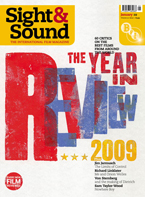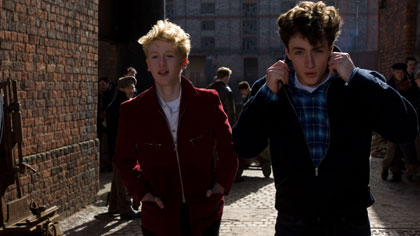Primary navigation


Sam Taylor-Wood's debut 'Nowhere Boy' ultimately says less about the young John Lennon's evolution as a musician, and more about the two women who loomed large in his teenage years. By Trevor Johnston
There is something intractable about before-they-were-famous musical biopics. No matter how much the artistes struggle to make their voices heard, we know they're going to make it, and we know what it's going to sound like when they get there. How to create dramatic tension, then, when it's inevitable that obstacles will be overcome? A favourite way round this is to dish the personal dirt in a way which, understandably, portrays the musical odyssey as only part of the story. So Ray, for instance, shows us Ray Charles before blindness struck, haunted by the childhood death of his brother, while Walk the Line traces Johnny Cash's acrimonious relationship with a father embittered by the tragic loss of his other son in an accident. By the same token, Nowhere Boy exists largely because of the unusual domestic arrangements of the young John Lennon, who was brought up by his aunt Mimi, only discovering in his mid-teens that his actual mother, Julia, was living nearby with her other children and her common-law husband.
Such tribulations do not necessarily a musical genius make, but they're obviously formative: to gauge their effect on the icon-in-the-making one has to look no further than the raw emotions of songs such as 'Mother' (effectively deployed here in the end credits) and 'My Mummy's Dead' on Lennon's soul-baring post-Beatles Plastic Ono Band album.
Whether Sam Taylor-Wood's first feature throws new light on the specific connections between such upheavals and the aspiring musician's route to success is a moot point, since generally speaking her film does a better job of laying out the component parts for our perusal than taking a specific line on how they fit together. Indeed, if the result feels accomplished yet somehow amorphous, that may be down to the script (by Matt Greenhalgh, who also wrote the Joy Division film Control). Attuned to the feelings of everyone involved, it takes something of an aerial perspective on events; we expect 'I Was a Teenage Beatle', but what we get is a sort of skewed ménage à trios.
It's a surprise, in a way, to see Kristin Scott-Thomas cast as a Liverpudlian housewife. Though she comes over a bit too posh throughout even for Aunt Mimi's airs and graces, her uncanny ability to embody pulsating feelings beneath an unyielding façade means that she pretty much walks away with the film, notwithstanding Anne-Marie Duff's fizzingly volatile Julia - and the best efforts of Aaron Johnson's callow yet cocky John to keep up with the pair of them.
While Master Lennon's confusing, even explosive encounter with his real mum provides the catalyst, the dramatic through-line works towards his reconciliation of the two sisters and his eventual understanding of Aunt Mimi's understated yet profound affection for him; in fact these elements of the story loom rather larger than the baby steps of Lennon and McCartney's skiffle combo the Quarrymen. Johnson's Lennon hints at the swagger to come, suggesting bruised sensitivity and an upswell of anger at the parental hand he's been dealt, yet the film sometimes leaves him as a supporting character in his own story.
All this rather seems as though it's skirting around the key issue - how did a 15-year-old schoolboy turn into one of the key musicians of the last century? Yet as one asks that question, inspired perhaps by the reels of news and interview footage in which Lennon nearly always seems the sharpest guy in the room, there's also a recognition that even if Nowhere Boy had come up with a neat encapsulation, it would most likely have seemed too pat to convince. As it is, the biographical details are handled with assurance - and without letting too much hindsight into the mix (the walrus doodled in a school exercise book seems cheeky rather than overly contrived).
The film is particularly good at delineating Aunt Mimi and Julia's radically different spheres: Mimi's twin-set world seems to exist in sundry shades of soul-sapping brown, but just across the park, in slightly less well-heeled streets, Julia's realm plays floral and animal-pattern prints off lashings of ruby red. After Mimi's stiff-upper-lip response to her husband's shock demise, Julia's upfront tactility with her son, and her brazen equation of rock 'n' roll with sex, sets his senses (and hormones!) racing. Indeed, the most daring scene in the movie sees John's recall of a tumble in the park with the school's sexiest lass intercut with mum's clasping arms as she snuggles into him on the sofa.
After registering this Oedipal flutter, the film never really pushes it much further, preferring instead a certain tidiness as musical developments tick over (John meets Paul, Paul and John meet George, local reputation gathers momentum) and the two key female characters are rounded out. Julia's full-on effervescence, we learn, masks an aching vulnerability and neediness manifested in her string of men, while Mimi's steely determination to ensure John gets his education is softened with moments of generosity and the driest wit. Mimi could so easily have been the two-dimensional villainess of the piece, but Taylor-Wood's camera keeps returning to her, patiently registering the emotional toll of parental responsibility in circumstances where her efforts seem to be going unrecognised. The film is dedicated to the late Anthony Minghella, a long-time supporter of Taylor-Wood who mentored her as she shot her short Love You More; it's in these light yet firm moments of compassion that his influence is most strongly felt.
Polished as it is, Nowhere Boy lacks the genuine tang of the early rock 'n' roll years that, say, Claude Whatham's That'll Be the Day managed from its rather closer vantage point of 1973. This is a very decent effort for a first-time director, but given the auteurist expectations created by Taylor-Wood's track record in the art world, it's hard to discern a distinctively personal take on the material, or indeed the medium. Although she has dealt with complex, scripted, even multi-screen material in her gallery work in the past, there's little sense here of the confrontational emotions and astute formal control she displayed in the likes of Pent Up or Travesty of a Mockery. Given that she has turned out music videos, premiered Love You More in Cannes and explored notions of masculinity via such A-list casting as David Beckham (her famed sleeping video for the National Portrait Gallery), Paul Newman and Dustin Hoffman (among those captured in the piece Crying Men), a full-length feature must have seemed like a natural progression. She certainly proves she can be trusted with the resources (I can't imagine fellow YBA Tracey Emin was inundated with offers after the tepidly received featurette Top Spot). But compared to the example of Steve McQueen's trenchantly drawn Hunger, her work here is all too ordered and mannerly.
The fragmented flashbacks to childhood memory, for instance, provide an opportunity to let loose cinematically that could have been grasped with more gusto; instead they turn out to be a plot device, a foreshadowing of the convenient cluster of revelations in the climactic three-way confrontation rather than a discrete expressive flourish in their own right. Perhaps in the context of a risk-averse, perennially cash-strapped British film industry lashed by global recession, it might have been idealistic to expect much more. If so, those idealists will be hoping that this calling card enables Taylor-Wood to push that bit harder next time round.
Walk the Line reviewed by Mark Kermode (February 2006)
Ray reviewed by Sam Davies (February 2005)
Hilary and Jackie reviewed by Nick Kimberley (February 1999)